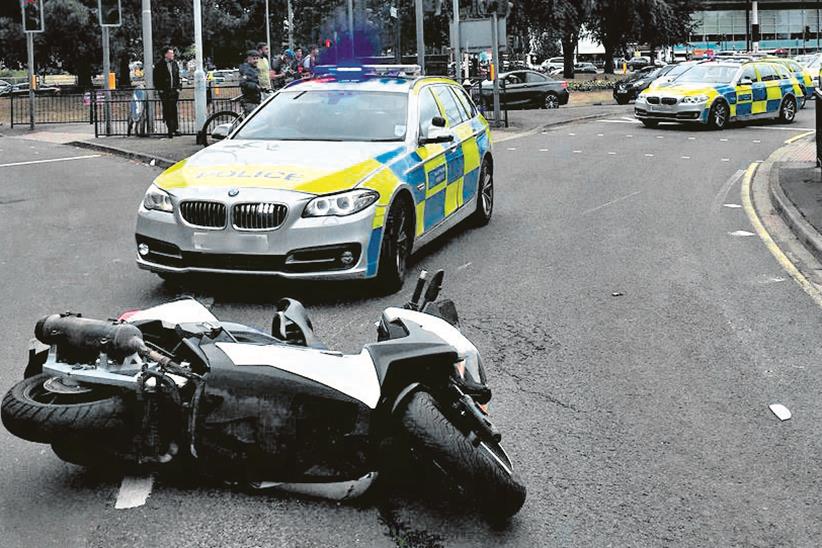Met Police officer who knocked a suspect off a moped is cleared of wrongdoing
Police Constable Edwin Sutton has been found to have not breached the standard of professional behaviour when he ended a moped chase with a ‘tactical contact’. PC Sutton was called before a gross misconduct hearing at the Independent Office for Police Conduct after the incident on May 21, 2017.
It was alleged that Sutton had breached the police standards of behaviour for the use of force when he manoeuvred his vehicle into the path of a moped being driven by a 17 year old male suspect. However the hearing on May 8, chaired by Catherine Elliot, found this was not the case.
After reviewing the evidence, the panel found that the manoeuvre executed by Sutton was for a legitimate policing purpose and that he had few, if any, alternatives for ending the pursuit quickly and safely.
“It should never have happened…one of my colleagues has been through 2 years of hell” See Chairman Ken’s full interview on the clearing of misconduct of Met PC Edwin Sutton here: pic.twitter.com/ZPJsDOzoaR
— Met Police Federation (@MPFed) May 8, 2019
The panel also found that the use of force was reasonable considering the circumstances and was proportionate for the apprehension of a suspected criminal. Had Sutton been found to have breached the code, he would have faced the sack.
This particular case has drawn considerable attention, especially as the Met Police have hailed the tactic as being essential to reducing crime. The Met say the ‘hard stops’ have been instrumental in cutting moped related crime by as much as 50% in some boroughs. Despite this, the Police actually have no legal protection for the manoeuvres currently.
The Home Secretary, Sajid Javid, recently announced plans to overhaul the laws surrounding police chases saying: “It’s vital police officers feel confident and protected when pursing suspects on the roads or responding to an emergency.
“It’s also crucial that we send a clear message that criminals – whether in cars or on mopeds – cannot escape arrest simply by driving recklessly.
“These proposed changes will strike the right balance, giving trained officers the confidence they need to fight crime effectively and ensure our roads are safe.”
Met Police tactics cause controversy
The Home Secretary, Sajid Javid, has come out in defence of the Metropolitan Police after a video demonstrating their latest tactics to stop moped criminals attracted criticism online.
The video (below) showed the police ending numerous pursuits with ‘tactical contacts’, which involves using cars to knock suspected criminals off bikes.
After the video was posted, Shadow Home Secretary, Diane Abbott, tweeted: “Knocking people off bikes is potentially very dangerous. It shouldn’t be legal for anyone. Police are not above the law.”
Knocking people off bikes is potentially very dangerous. It shouldn’t be legal for anyone. Police are not above the law https://t.co/boptGhJYbB
— Diane Abbott (@HackneyAbbott) November 27, 2018
But Javid has now spoken out in defence of the Met’s methods, and said: “Risk-assessed tactical contact is exactly what we need. Criminals are not above the law.”
![]()
Camden Police also responded directly to Abbott, saying: “Someone who’s responsible for law-making (or at least debating and ratifying new legislation) should probably realise that using tactical contact to terminate dangerous pursuits is entirely within our lawful power.”
When questioned whether the safest option would be to just end the pursuit altogether, they said: “There are plenty of instances where a terminated pursuit has later ended up with the suspect vehicle crashing, and causing more injury and damage than if it had been terminated as safely as possible in the circumstances at an opportune moment.”
While seen as potentially controversial by some, an online poll found that over 98% of MCN readers are in favour of the tactic. The Met are also keen to point out that the tactic has been a great success and has been key to helping them reduce moped-related offences by 36% this year.
The Met also said there are currently ‘no rules on the maximum speed’ at which their pursuit drivers could hit a moped and that it was a common misconception among moped thieves that driving dangerously, at speed or removing a helmet would result in a police pursuit being called off.
A Labour spokesman said: “Major operational changes by the police that affect public and police safety need to have clear oversight and follow due process, especially where there is a potential impact for legal ramifications.”
More from MCN
- Moped criminals hit hard by new police tactics
- MCN joins North Wales Police for a day on their patch
- 11 years for pair who profited from £1million of stolen vehicles


